Concrete Sealers and Coatings
Concrete sealers add life, luster, and beauty to decorative concrete floors. Sealers also help to resist staining and contamination, increase abrasion resistance, and lower cleaning and maintenance costs. With stained or dyed concrete, proper sealing will enhance the depth of color to concrete floors.
The MJA Company will guide you in selecting the best sealers for your floor
Since there are so many sealer choices available, we recommend a thorough inspection of your floor’s condition and details about how your floor is used. Once the inspection is complete, The MJA Company’s technicians will provide you with a detailed report and recommendations that are tailored to your specific floor requirements.
In all cases, The MJA Company will match your floor sealing expectations and VOC Compliance requirements with manufacturer’s specifications before recommending any products.
NOTE: While concrete sealers and coatings may look the same, there are important distinctions between chemistry, gloss, slip-resistance, abrasion resistance and whether they are suited for interior or exterior use.
The MJA Company will guide you through the types of sealers and coatings and make specific recommendations based on your floor and expectations.
Concrete sealers generally fit into one of 6 categories:
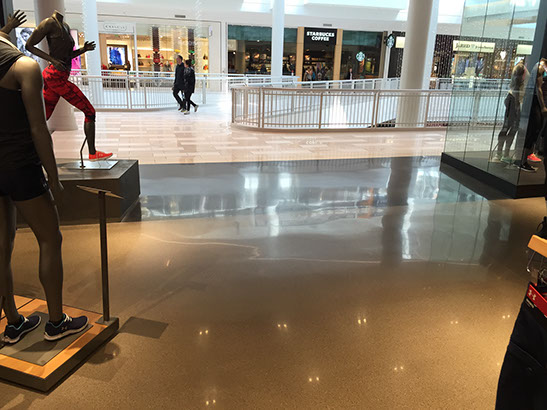 1. Acrylic Floor Sealers
1. Acrylic Floor Sealers
- Create a thin film on the concrete surface.
- Suitable for interior and exterior concrete.
- Standard acrylic sealers dry quickly, reducing downtime.
- Provide standard protection against staining, water, and chlorine intrusion.
- Should be treated with floor polishes on a regular basis.
- Available in solvent-based and water-based formulas.
- Solvent-based acrylics generally provide better protection, color enhancement, and wear longer than water-based acrylics.
- Acrylic floor sealers are not breathable and are not recommended for floors that are subject to hydrostatic pressure. Water vapor or moisture will be trapped between the concrete and acrylic coating and may causing blistering and delamination.
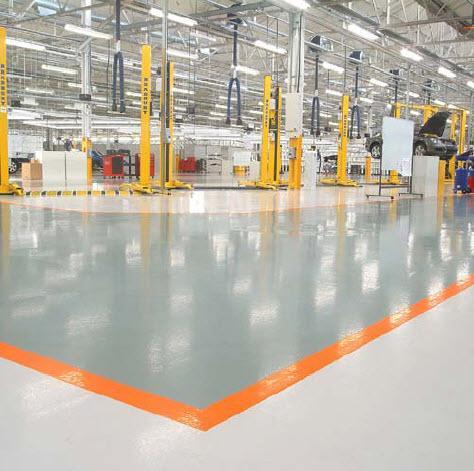 2. Epoxy Floor Sealers
2. Epoxy Floor Sealers
- Create a thick film on the concrete surface.
- Most epoxy floor coatings are two-part mixes and must be applied quickly after mixing.
- Not recommended for floors that are subject to hydrostatic pressure. Water vapor or moisture may be trapped between the concrete and epoxy coating and may cause blistering and delamination.
- Epoxy sealers must not be applied to previously sealed or painted surfaces unless previous coatings are completely removed.
- Concrete must be free of all contamination to assure proper bond
- Epoxies may be subject to UV discoloration and not generally recommended for areas that receive direct sunlight.
- Epoxy coatings are available in clear or pigmented colors.
- Various colors may be applied to same floor, allowing decorative possibilities such as striping, safety zones, and directional markings.
- Decorative colored chips can be added to enhance decorative look and to camouflage surface dirt.
- Epoxies provide excellent protection against staining, water, and chlorine intrusion.
- No additional polishes or waxes are required to maintain shine.
- Available in solvent-based and water-based formulas.
- Epoxy coatings provide excellent abrasion resistance.
- Epoxy coatings are generally dry to the touch within a few hours of application, but require a minimum24 hours curing time before foot traffic or movement of furniture or fixtures. A minimum curing time of 72 hours is required before heavy equipment or vehicle traffic.
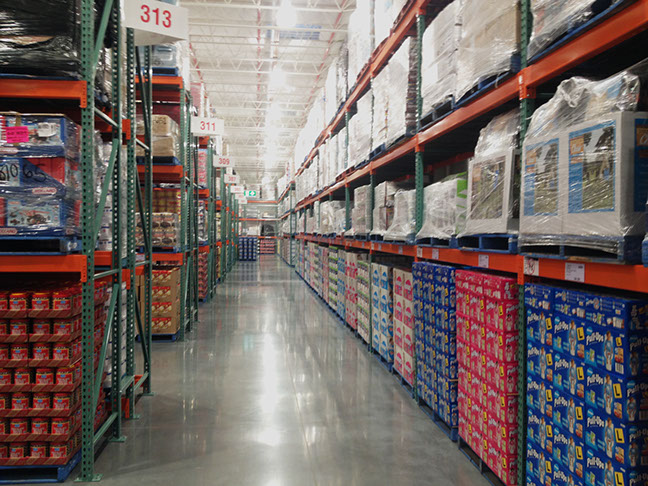 3. Penetrating Concrete Floor Sealers
3. Penetrating Concrete Floor Sealers
- Generally formulated as liquid silane, siloxane, silicate, or combination of silane and siloxane.
- Unlike other sealers, penetrating sealers become a permanent part of the concrete through a chemical reaction with the top layer of concrete.
- Penetrating sealers do not change the appearance of concrete.
- Penetrating sealers retain slip resistant properties of untreated concrete.
- Unlike film sealers, concrete floors treated with penetrating concrete sealers are not more slippery when wet.
- Penetrating sealers do not increase shine or luster.
- Hardens concrete surface.
- Reduces dusting.
- Moderately effective in reducing tire marks.
- Penetrating sealers have little effect on prevention of staining from oil or chemicals.
- Suitable for interior and exterior concrete.
- Since penetrating sealers actually become part of the concrete surface, freeze-thaw cycles do not effect performance.
- Penetrating sealers densify the concrete surface, resisting salt and chloride used in deicing, helping to prevent corrosion and moisture penetration.
- Since penetrating sealers do not create a film on the surface of concrete, the concrete remains breathable. Blistering, peeling, and trapping of moisture are prevented.
- Penetrating concrete sealers are not affected by UV light.
- Penetrating sealers are suitable for indoor and outdoor use.
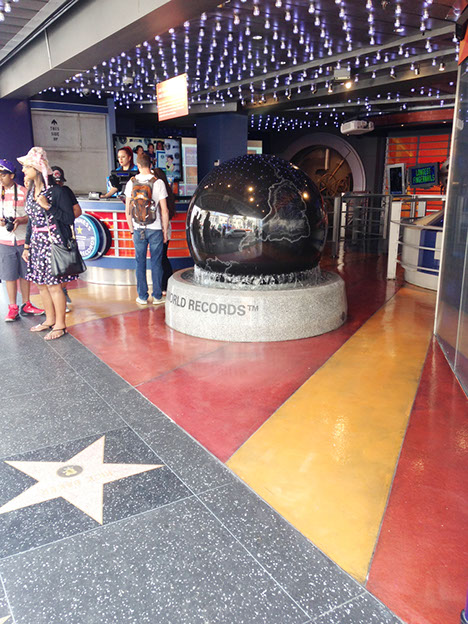 4. Polyaspartic Concrete Floor
4. Polyaspartic Concrete Floor
- Polyaspartic floor coatings are relative newcomers to the variety of concrete floor sealers.
- If you are not familiar with polyaspartics, think of “epoxy on steroids”, except they are made of entirely different stuff.
- Polyaspartic coatings offer the advantages of epoxies and polyurethane, combined.
- Polyaspartic floor coatings are thicker and tougher than epoxy floor coatings.
- The temperature tolerance range for application is very forgiving, with installation possible in sub-zero to 140+ F.
- Polyaspartic floor coatings cure very quickly. In most cases, a floor is returned to service within a few minutes to a few hours of application, as compared with days of curing time for epoxy coatings.
- Polyaspartics have a very short pot life. That is, once the installation process starts, it must be completed very quickly.
- UV tolerant.
- Heat tolerant. (Depending on manufacturer, polyaspartic floor coatings can withstand temperatures in excess of 300 degrees F.)
- Excellent abrasion, stain, and chemical resistance exceed epoxies and urethanes.
- Polyaspartic coatings are available in clear or pigmented colors.
- Color chips may be added for decorative and textural enhancements.
- Slip-resistance can be enhanced with additives.
- Polyaspartic floor coatings are not recommended for floors that are subject to hydrostatic pressure. Water vapor or moisture may be trapped between the concrete and floor coating and may cause blistering and delamination.
- Polyaspartic floor coatings can be a bit tricky and results can be disappointing if left to an inexperienced contractor. The MJA Company is factory-trained and fully equipped to assure an outstanding floor.
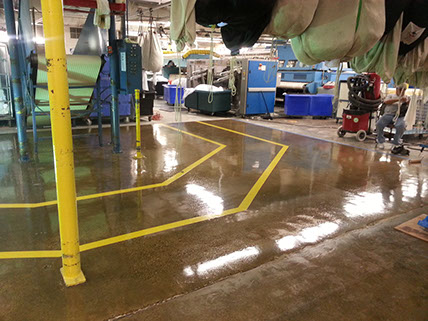 5. Polyurethane Concrete Floor Sealers
5. Polyurethane Concrete Floor Sealers
- Polyurethane sealers are most often mixed as a 2-component sealer, made of a liquid resin and a hardening chemical.
- Polyurethane sealers provide a thicker seal than single-component acrylic sealers.
- Can be used on decorative, stained or dyed floors or bare concrete.
- Provide excellent abrasion resistance and resist scuffing and marking from shoes and tires.
- Polyurethane sealers are good for high-traffic areas.
- Not subject to UV discoloration or yellowing.
- Polyurethane floor coatings require a dry, dirt, and dust-free surface for proper application and sealing.
- Moisture reacts with resins and will cause frothing or bubbling, resulting in a poor finished product. Correction of this potential problem is time consuming, labor intensive, and expensive.
- Excellent chemical resistance.
- Polyurethane sealers are not breathable and may suffer from moisture migration from below the concrete surface. Polyurethanes are not recommended for floors that are subject to hydrostatic pressure. Water vapor or moisture will be trapped between the concrete and polyurethane coating and may causing blistering and delamination.
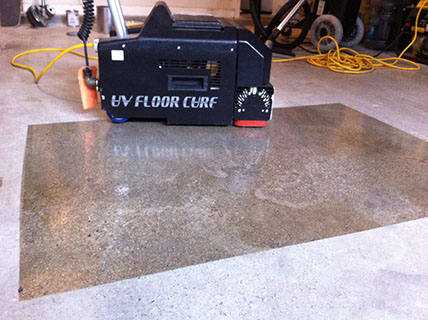 New: Instant Curing UV Urethane
New: Instant Curing UV Urethane
- New DiamaPro UV is a single component, ultraviolet light cured, low VOC, aliphatic urethane that is highly water and chemical resistant, and adheres exceptionally well directly to concrete and other resinous flooring materials using no primer.
- DiamaPro UV offers outstanding durability against scratching and abrasion. Once cured it produces a high gloss image that is sharp and will not produce a blurred appearance. It incorporates a unique combination of an aliphatic urethane and photo initiator, while maintaining excellent chemical and UV ray protection.
- DiamaPro is UV cured as it is applied There is no more effective or efficient concrete protection process. DiamaPro UV is a single-component protective coating—no mixing of multiple components is required, and errors resulting from improper mixing are eliminated. The aliphatic urethane coating contains a photo-initiator that acts as the catalyst when exposed to ultraviolet light for instant curing.
- The floor can return to full service immediately after installation.
6. Polyester and Vinyl Ester Coatings
- Polyester and Vinyl Ester coatings are used in areas that are subject to acidic contamination or that require a high level of protection from spills.
- Because of the relative thickness of these materials, they are sometimes referred to as “linings.” Polyester and Vinyl Ester coatings are applied much like epoxy coatings, but require more skill and may require extended curing time.
- When properly selected and professionally applied, polyester and vinyl ester coatings provide a smooth surface that will meet even the most demanding specifications.
- As with epoxy coatings, additives may be used to increase slip-resistance and to add color flecks/grains to the floor for aesthetics and to camouflage the presence of dust and dirt.
- To work properly, these coatings must be applied to extremely clean floors that are in excellent condition. Because of the relative thickness of polyester and vinyl ester coatings and their chemistry, heat is expected during the curing process. It is generally recommended that resins be added to the coating to help prevent shrinkage, cracking and delamination.
For more about coatings, we recommend reading this article before proceeding with your selection:
Polyester and Vinyl Ester Coatings
Lloyd M. Smith, General Editor, Corrosion Control Consultants and Labs
